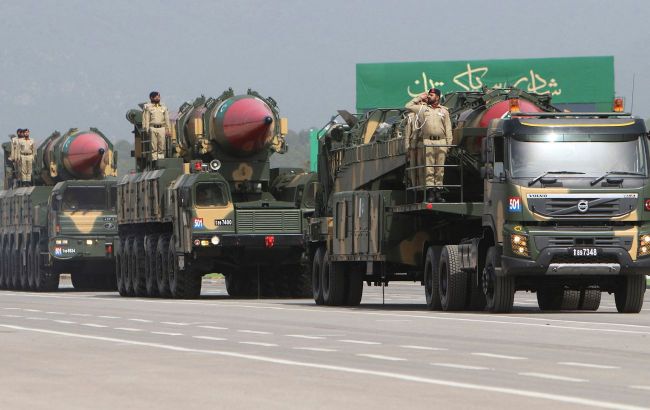Iran-Pakistan escalation: Reasons behind exchanged strikes
 Iran-Pakistan escalation (Getty Images)
Iran-Pakistan escalation (Getty Images)
Iran and Pakistan have recently exchanged strikes during "counterterrorism operations" that have led to a dispute between the two countries, escalating into a diplomatic crisis.
Find out what is happening and why Iran and Pakistan are exchanging strikes in the article below by RBC-Ukraine.
To prepare the story, the following sources were used: Pakistan Ministry of Foreign Affairs, Reuters, CNN, and the Iranian state news agency Tasnim.
According to Reuters, the Pakistani Armed Forces have raised their combat readiness to an extremely high level amid heightened tensions with Iran.
In response, Iran has announced large-scale military exercises involving aviation. The Prime Minister of Pakistan is reportedly returning urgently from Davos, according to media reports.
What happened
On January 15-16 night, the Islamic Revolutionary Guard Corps of Iran attacked "anti-Iranian" targets in the Pakistani province of Baluchestan using ballistic missiles and drones.
As the Iranian state news agency Tasnim reported, the attack targeted an area in the Pakistani province of Baluchestan, "where one of the largest headquarters of Jaish ul-Adl was located." Both headquarters, as informed by Tasnim, were destroyed.
Pakistan, in turn, declared the illegality of these actions and claimed that two children were killed as a result of the strike. Pakistan's Ministry of Foreign Affairs spokesperson, Mumtaz Zahra Baloch, called Iran's actions "unprovoked and flagrant violations of Pakistan's sovereignty by Iran, a violation of international law, as well as the goals and principles of the UN Charter."
Besides, Islamabad recalled its ambassador from Iran in protest against the attack and stated that it "keeps the right to respond" to Tehran's "unlawful attack." It eventually happened, and Pakistan announced strikes on "terrorists' hideouts" in Iran, claiming the elimination of a number of terrorists.
"This morning, Pakistan conducted a series of highly coordinated and specifically targeted military strikes on terrorist hideouts in the Sistan-Baluchestan province in Iran. During the operation... a number of terrorists were eliminated," the statement says.
Iranian media, in turn, report that several rockets hit a village in the Sistan-Baluchestan province, bordering Pakistan. According to an Iranian official, 9 people, including women and children (none of them Iranian citizens, according to local media), were killed in the strike. There are also reports of shelling near the city of Saravan, 40 km from the border.
Why the escalation is taking place now
The struggle of Pakistan and Iran against separatist militants operating on both sides of their borders is not a new development. Particularly, Tehran considers a Sunni militant group Jaish ul-Adl ("Army of Justice") as a terrorist organization.
In December, this group claimed responsibility for an attack on a police station in Sistan and Baluchestan, resulting in the death of at least 11 policemen.
Experts suggest that the larger regional conflict in the Middle East between Israel and Hamas may have inspired Iran to be more active in pursuing goals beyond its borders. Just a day before striking Pakistani territory, Tehran had launched attacks on northern Iraq and Syria.
Border conflict
The two countries, Pakistan and Iran, share an unstable border spanning over 900 kilometers (560 miles). Iranian and Pakistani forces jointly combat Baluch insurgents seeking "independence for their divided people."
However, as CNN notes, while both countries have a common enemy, it is unusual to see both sides attacking militants on each other's territory. Western media notes that these strikes are happening at a time when the so-called Axis of Resistance (Iran's network of allies in the region) is confronting Israeli forces and their allies in the Gaza Strip.
Ethnic Baluch guerrillas have been fighting against the Pakistani government for decades, seeking "separation for their region" and accusing Islamabad of "unfair exploitation of the rich gas and mineral resources of Baluchestan."
What is next
A diplomatic dispute has erupted between Pakistan and Iran. Pakistan has recalled its ambassador from Iran, while the Iranian ambassador in Pakistan, visiting Tehran, will not be allowed to return. Islamabad also has suspended all high-level visits to its neighbor.
Several countries have already responded to the conflict. India stated that it "does not tolerate terrorism" and sees the attacks as a "matter between Iran and Pakistan." China called on both countries to "be restraint and avoid further escalation."
The U.S. has also reacted. The U.S. State Department representative, Matthew Miller, states that Washington is working to prevent a full-scale conflict in the Middle East.
As Western media points out, Pakistan's strike in response to Iranian territory shows that it has chosen to react not only by diplomatic consequences.
However, it remains unclear whether Iran or Pakistan will choose to engage in full-scale military actions against separatist groups, which both states consider enemies.
In Islamabad, the strike is referred to as the implementation of the Marg Bar Sarmachar operation. The country's Ministry of Foreign Affairs adds that it "fully respects the territorial integrity of Iran," and that the "strike was carried out solely to ensure security against terrorists."

